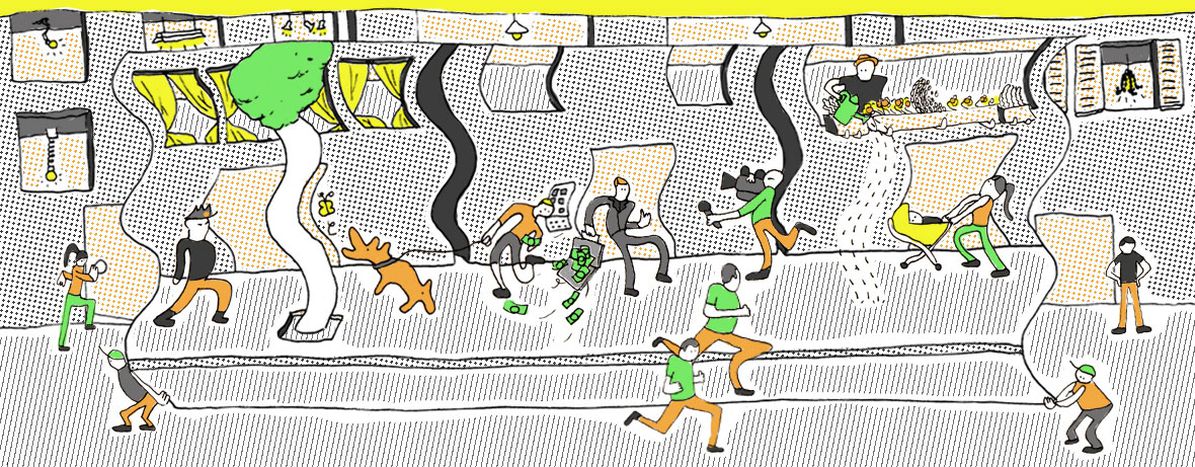
Le Gorafi: "Satire is a mirror held up to society"
Published on
Translation by:
Emily SpencerSince the 2012 presidential elections, Le Gorafi has entertained more than 3 million readers a month with its distinctive, satirical articles. Taken up by traditional media outlets and even quoted by some politicians, the "gorafisation" of France encapsulates the impressive influence the site has had on politics. We asked co-founder Sebastian Liebus to explain Le Gorafi's success.
cafébabel: Over the years, we have seen a multitude of parodic news sites come and go. How do you explain your success?
Sebastian Liebus: We live in absurd times. People need an alternative source of news, another lens through which they can interpret the world around them. We have been able to provide that, and it shows; we get almost three million visitors per month.
cafébabel: What topics are the most popular?
Sebastien Liebus: It's hard to know in advance if an article is going to work or not. Currently, in the run-up to the presidential elections, our focus is predominantly on the latest political developments. We have exactly the same approach as any other media platform.
cafébabel: Is it difficult to compete with real events when the political class lends itself to caricature?
Sebastien Liebus: It's a real challenge, which means that we're constantly having to reinvent the wheel. Donald Trump, for example, is very difficult to sartirise because when it comes to the Trump administration, satire has become reality. He has done some outrageous things that you simply can't sartirise and besides, it's no mean feat to be subtle without being dull. The effect can be sad or comical.
cafébabel: How was Le Gorafi born?
Sebastien Liebus: Technically, we launched the site in February 2012, during the presidential campaign. Historically, Le Goriafi was created in 1826 by our managing editor Jean-Francois Buissiere. It now boasts almost 650 editors around the world. [laughs].
cafébabel: What is your finest article?
Sebastien Liebus: There are many. I suppose I could say the one about a contestant on the game show Fort Boyard who was left in a cell for seven years, or the man who ended up being held in custody for smiling on the metro. But we don't really have a preference. We like all of our stories, even if they aren't necessarily well-received by the public.
cafébabel: What about your satirical European counterparts?
Sebastien Liebus: We've had several opportunities to meet with and talk to with The Onion, which was a proud moment for us. There is also The Daily Mash, in England, which we only know from afar. Outside of Europe, there is El Manchar in Algeria, which is very successful. However, I refuse to comment on the the Belgian site [Nordpresse]. I find their work very dangerous.
cafébabel: What do you think about how the news is covered?
Sebastien Liebus: Living in an era of fake news, we can't ever really be sure about who is telling the truth. 'Fact-check' tools have become popular recently even if they aren't used by everyone. That said, Russia established its own network for fact-checking to spread propaganda. Russia Today used fact-checking to remove articles on piracy by Russian hackers. It's not always used for the right reasons.
cafébabel: Do you think that your site has an impact on politics?
Sebastien Liebus: No, we hate it when we have to shoulder the responsibilities. Let's not pretend to sermonise. Satire is a mirror held up to society. It's up to you to accept or reject its reflection. Recently, we did a running-gag on Emmanual Macron searching for his political programme, and we were often asked if we weren't afraid of making him likable. The answer is no, we have no desire to make anyone more 'human' - or anything else for that matter. In stark contrast to Guignols de l'Info [a satirical show involving puppets] which went out of its way to humanise its 'characters' and ended up making Jacques Chirac seem almost nice in 1995.
cafébabel: Have you witnessed a certain sensationalism in the press recently?
Sebastien Liebus: I believe that the press is changing, inspired by The Onion's model in the way that it deals with different facts or insignificant events We feed off traditional media such as BFM or 20 Minutes, which broadcasts offbeat news and clickbait to make people laugh We use some of their ideas, but ultimately, it's them who copy us.
Translated from Le Gorafi : « La satire est un miroir que l’on tend »



